The Light from the TV Shows: A Chat with Dick Cavett
Dick Cavett steps out of the elevator, hangs a right, and strolls into the lobby of the Beverly Hilton, a man on a mission: to participate in the promotion of a PBS documentary which premieres on August 8 at 9 PM EST/PST: Dick Cavett’s Watergate, an examination of the Watergate scandal and its effects on Richard Nixon’s presidency that’s structured around archival clips from Cavett’s late night talk show.
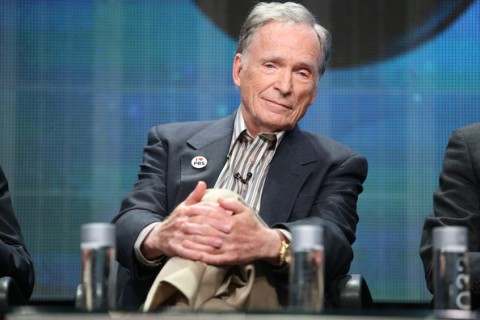
After introducing himself, Cavett can’t resist making an observation about the familiarity of his surroundings: “You know, this is the same lobby where I stood when I was out here for two weeks auditioning to be a writer on The Jack Paar Show.” As has been the case for Cavett on more than few occasions during the course of his half-century (and then some) in the TV business, this observation proves to be only the first sentence of an anecdote.
“I came into the hotel one night and I heard singing,” continued Cavett, glancing and vaguely gesturing at the entrance to a nearby ballroom. “I opened a big door, and Judy Garland was onstage. The lights came on, and there were George Burns, Jack Benny, Edward G. Robinson, Barbara Stanwyck, Kirk Douglas, and about a hundred more. It was a huge charity thing. You couldn’t see any face that you didn’t know!”
With this brief recollection, Cavett immediately confirms that at least one of his lines during his memorable appearance on The Simpsons was absolutely spot-on: he really does have some wonderful stories about famous people that involve him in some way.
Who came up with the idea of viewing the Watergate scandal through the prism of your show?
You know, I think (executive producer Robert S.) Bader did. I’m almost certain he did. Yeah, he’s the one who’s most up on tapes that I had and stuff like that, so I don’t think it could’ve been anyone else. He just went through the stuff. I think initially he looked at 350 Cavett shows to make the (Shout Factory) DVDs, and then he just finally had to stop looking at them and start making them! But I was stunned to find how much stuff we have. It’s going to be a strain to make it only an hour. There’s so much good stuff. That’s a luxury, because there are so many shows that are a strain to make even an hour.
Speaking of those DVDs, people who only know your show from what they’ve seen via those Shout Factory sets may be surprised to find out just many political figures you had on as guests.
This is true, because the Shout Factory categories didn’t really include (politics). I wouldn’t be surprised if it’s mentioned somewhere by somebody on some of them, but, no, those categories were comedy, rock, or Hollywood greats, and then Ray Charles and John and Yoko. That’s Yoko Ono, for young people who don’t remember who John and Yoko were. Doesn’t that gripe you? This year, I’ve endured being asked, “Who are the Marx Brothers?” As if they were two acting twins or something. And “who is Johnny Carson?” But a friend of mine made me feel better by having also gotten “who is Johnny Carson?”
What would you say the percentages were of political figures versus entertainment figures?
I would love to know what they were, because you can’t remember everything you’ve ever done…or even half of it! When they said, “Do you have a lot of Watergate stuff?” I thought I had probably five or six shows at least where it came up. My God, it’s all over the place! There really could be two hours of it. Maybe there’ll be a sequel! It also surprised me in watching it how much I had forgotten (about Watergate), because it was such a huge thing at the time. People who didn’t live during it can’t conceive of it.
Maybe they remember the O.J. (Simpson) trial. That was something you watched all day. Or if they’re really old enough, the Army-McCarthy hearings, which were the first time in my life you invited people into your hot living room in un-air-conditioned Nebraska, and they watched from nine to five without moving, with an electric fan behind the TV set to keep it cool. But Watergate… Boy, you woke up every morning with just a leap out of bed, saying, “What will be the latest? What has he done now? What have they got? How far are they getting?” And. God, it just got better and better.
So what was your opinion of Nixon pre-Watergate?
The usual: a drab, probably corrupt politician. Highly intelligent. A highly intelligent man. A friend of mine was TIME Magazine’s Supreme Court reporter for two years, and he said when Nixon was there, it was a treat, because his presentations were so brilliant, so thorough, so beautifully researched, and his memorized quotations of things, without notes… He was just an overwhelmingly great lawyer.
Of the guests you had on at the time, G. Gordon Liddy was definitely among the most entertaining. Even then, you could see flashes of the personality that would lead him into a career on radio.
Yeah, he was, to me, a very likeable rogue who had a real showbiz sense about him and knew what played before an audience. You can catch that with a guest right away, the ones who know. They’re not uncomfortable, they like being in front of an audience, and they know how to do it. Liddy was a fascinating guy. I hit him with one question – “I read that you like to, when you’re visiting somebody’s offices, teach the secretaries how to kill somebody with a pencil” – and he had not admitted to that. And I asked him to show me, and being the humane figure that he is, he would not do it on the show, but he would teach me later in the green room.
And did he?
He did. And I traded him a lethal judo hold that I almost killed a kid with. As a studious child, when other kids were playing baseball, I was in the Lincoln Public Library, reading, and I found an ancient judo book with a neck hold in it so lethal that they finally banned it from judo. It was in a book called Modern Japan 1928. And I got that hold on Liddy in the green room, and for a mad moment I thought, “I hope I don’t lose control…” In fact, I told him that. And he replied, “Thank you for that,” and said it quite seriously. I don’t know if it’s been used since!
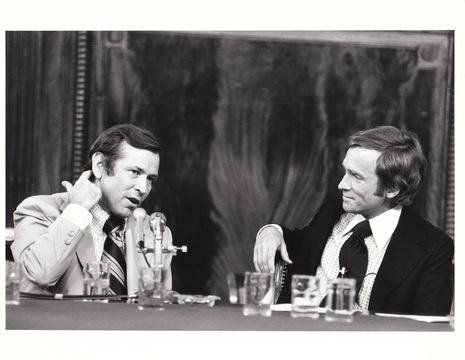
In the documentary, it’s suggested that your program was, insofar as talk shows go, really the only place on television where Watergate was being seriously discussed.
I couldn’t testify to that, because it strikes me as impossible. I mean, I can’t imagine that. I was often used as a stick to beat Johnny (Carson) and Merv (Griffin) with after they got the mistaken impression that I was an intellectual. I always feel sorry for anyone who’s never seen an intellectual if they think I’m a real one. But they were saying, “Dick does all the serious stuff.” God, I had every comedian ever on the show! And people from sports and music and… [Trails off.]
My answer to that is that I had a different philosophy of the show than Johnny did. He was an entertainer, and he was much more intelligent than he thought he was, which I always used to kid him about. I liked him so much. And I know Merv must have done something on it. He had to, because he liked to be called not just an entertainer, so I don’t see how he couldn’t have at least had Martha Mitchell on!
Certainly it would be fair to say that you were prone to hitting it harder than most of your talk-show peers.
That could be. Bader said, when he had looked at some of these things that I hadn’t seen yet, “I’m surprised at how hard you are on some of the people.” (John) Erlichmann was not comfortable in my presence, nor was he made so by me. I don’t remember (Herbert) Klein being stuck, clearly. But I do remember the great Sam Ervin saying – was it somewhere in the hearings? – something like, “Yes, that’s what I said, and I said it my native language, English, which is where I make myself best understood.” That may be an inexact quote. But I loved his sense of humor.
I never got to have John Dean on, but John Mitchell came on with an entirely Nixon and Watergate show. An unopposed show. And he also had that comfort in front of an audience, and they took to him right away. Other people don’t create that impression. Nixon certainly couldn’t. But Mitchell had a certain personal charisma that was attractive…and nice for a man who was willing to break the law for a criminal president. I hope that’s not insulting!
When you were hitting Watergate that hard, was there ever any point when your producers came to you and said, “Look, maybe you’d better tone it down a bit”?
My producers never came to me that I can recall – although ABC was probably uneasy – and Bader tells me about some other stuff that I haven’t seen yet that he’s going to run off for me to see. But Nixon had tapes of about 30 Cavett shows made for him. Whether that was because he suspected that he was going to have a lot of time to watch TV pretty soon or whether he was just secretly a huge fan of mine, I couldn’t say. But I guess I may be the only talk show host who A) has had a man die during a taping, but that’s a whole other story, and B) has heard the most powerful man in the world, the President of the United States, say of him, “Cavett: what can we do to screw him?”
I get a strange sensation each time I watch it. It’s on YouTube! That bit is there, under “Nixon White House Wants Revenge on Cavett Show.” They wanted revenge on me several times. I guess the first one was the SST controversy, which seems so forgotten now, so over. And then testifying that John Lennon should not be booted out of the country. As H.R. Haldeman, Nixon’s prime lickspittle said… [Starts laughing.] That’s an Elizabethan term, as you probably know, and it needs reviving! But Haldeman said, “This man can sway an election!” Lennon, I mean. Not me!
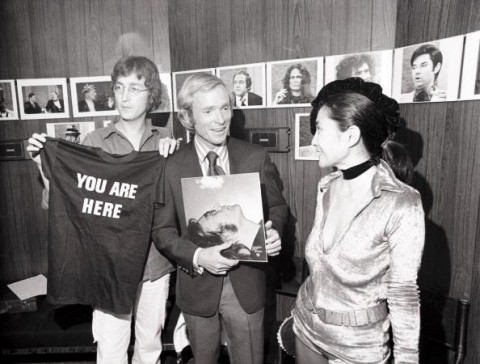
You only discovered that information relatively recently, right?
Relatively recently, yeah. I got in a car out here, at the airport, and it was like the beginning of a John le Carré spy story or something: a man I didn’t know joined me in the backseat, flipped open a laptop, and there were Nixon and Haldeman. And from the tapes, you hear, “What is Cavett, anyway?” “Oh, he’s the worst.” I don’t want to spoil the rest of the story, but…oh, what’s his phrase? “We’ve protested bitterly about the Cavett Show.” I didn’t hear bitter protests. Maybe there were unsuspected Democrats at ABC? But real, true Conservative Republicans, respectable people, also knew that Nixon was a crook. Gore Vidal said that, in his way, he’s probably the most honest president that we’ve had in a long time, because he always told you what the case was by stating the opposite of it…as in, “I am not a crook.”
You had a couple of close encounters with Nixon, but would you have ever been interested in interviewing him?
I would’ve liked to have done him, yeah. I never made the effort. I never thought he would. Maybe by the time I might’ve wanted to, I had already alienated myself. Although my late wife and I were invited guests at the White House for an evening of Shakespeare, and I met him then for the first of two times, in the reception line. The dialogue was…not so sparkling that your readers and fans will think it’s from Oscar Wilde and Oscar Levante. “Mr. President,” I said. “Yes, who’s doing your show tonight?” he said to me. I said, “Joe Namath,” which was true. He sat in for me. And he said, “How are his knees?” And I…hadn’t examined his knees lately, so I said I didn’t know.
But it showed that he had probably something prepared for each person like that. He was good that way. You know, “Give me a line about this. Tell me who this person is. Tell me the name of one of their records, and I’ll hope I get it right.” My great friend Percy Heath, the bass player of the Modern Jazz Quartet, or the MJQ, his group was introduced by Nixon by him saying, “As we jazz buffs say, the MJQs!” Percy immediately started to laugh and had to throw a hand over his mouth. Somebody said once said that they think what may be the truest thing ever said about Nixon at the time was by me in a monologue. And I said, “What?” And they said, ‘There’s one thing you can say about President Nixon: he’s not groovy!” He might even have admitted that himself!
By the way, in one of my blogs – it’s in the book Talk Show, so it would’ve been during my first couple of years at the (New York) Times – I talk about my second meeting with Nixon. The line I’m most proud of in it was when I got to the end of that encounter, and I said, “It seemed that even the gulls had fallen silent.”
You’d like to think that, if you had interviewed Nixon, it would’ve at least gone better than that.
I would think so. At the very least, his daughter (Julie) wouldn’t have been there to say, “I hope your nightclub act was funnier than that.” A line a couple of writers have picked up on in that piece – and I hope I wasn’t copying someone – was described how, when you first met him and looked into his face, in regards to his nose, “the thing that struck you most was its appalling width. As wide as your first two fingers held together.” The Herblock cartoon was accurate. It wasn’t an exaggeration. He had a very strange nose from the front.
But what an exciting time it was. Someone – I don’t recall who – said, “I just had to wake up every day and get my Watergate fix.” Another firing, another cover-up. Like (Archibald) Cox. I went into a restaurant in Vermont, I think it was, over to a man and a woman sitting in a window…and the man was John Kenneth Galbraith. And I said, “Nixon has just fired Cox. It’s live out in the other room.” He said, “You’re kidding, of course.” I said, “No!” And I met Galbraith again years later, and he said, “You’ll always be the man who told me about Nixon and Cox.”
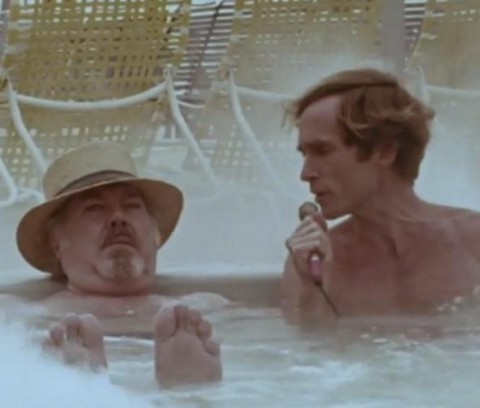
To discuss a few non-Watergate things in your back catalog, you were a supporter of Robert Altman’s work pretty early on. How did you come to end up in his film HealtH?
I don’t know! I assume it had to do with his being on my show. He was on at least one show, and I’m pretty sure two, but one of them is in the DVD box set Hollywood Greats, and it’s the only one in there that has four people: Altman, Peter Bogdanovich, Mel Brooks… I see you nodding. You’ve heard of some of these people. [Laughs.] And Frank Capra! So to me I get a feeling of disbelief. Frank Capra, he was wonderful. So I got to be friends with Altman from that, and then he asked me if I wanted to be in HealtH, his least-known movie. It opened here (in Los Angeles) to disastrous reviews, then it opened in New York, where Vincent Canby said, “I don’t know when I’ve enjoyed a movie more.” Between those two, it played at the Film Forum for a couple of weeks. And…oh, God, I had an awful experience with that movie, and I’d almost repressed it, and you’ve done me the favor of bringing it back.
I do that for a lot of people.
You must have many friends. But as I was leaving the screening in New York, either someone from the press or…well, it could’ve been anyone who actually asked, because it was a mob, and there were certainly cameras and reporters. But someone asked, “How is it?” And I said, “The kid’s not very good,” meaning me, because I was young as hell! The next day, someone said, “Have you seen the Post or the News?” And the headline was, “DICK CAVETT TURNS CRITIC.” Tell me when you see it coming. “Leaving the theater last night, someone said, ‘How’s the movie?’ Cavett said, ‘It’s not very good.” [Groans.] It kills me even now! Thankfully, Altman may have been one of the few people in the world who’d believe someone who said they didn’t say that. Boy, I learned fast from that: enunciate…and then grab their pad and pen and see if they wrote it down right!
How did you enjoy the experience of doing The Simpsons?
That was fun! It was five minutes. It was the easiest job of my life! Somebody said to me lately, “We were harder on you than we were on almost anybody,” and they were kind of ashamed of it. I guess I didn’t get it! And…I don’t know, maybe it was Richard Corliss at TIME who said to my friend Chris Porterfield, who was an editor on the show, “Your friend must have a carapace as thick as iron” – or something like that – “for what they did to him on The Simpsons.” But I didn’t mind it. I got a laugh!
How did you feel about Rick Moranis’s impression of you on SCTV?
Oh, I loved seeing that. He’s really good. Nobody has ever gotten my voice precisely, but his ability to get the inflections and the pronunciations and the gestures made up for it. In fact, every so often I still get that out and look at it.
A few years ago, you and Mel Brooks teamed up for the HBO special, Mel Brooks and Dick Cavett: Together Again. It must’ve been intimidating to step into Carl Reiner’s shoes somewhat when you first teamed up with Mel to do a series of Ballantine Beer commercials in the ‘60s.
Oh, it was! Yeah, they apparently couldn’t get Carl. I remember I showed up on time, Mel was a little bit late, and when he got there, he burst into the room to meet me, and he almost immediately informed me that I was spectacularly gentile. But he must’ve wondered about me, because here was this sort of fresh-faced kid. I wasn’t on TV yet. I was still in nightclubs! They discovered me on the Bitter End stage, in fact. A woman named Lucy – I only indulge myself with her name because we forget so many, those of us who are over 30 – from…what agency? I should remember, because once the commercials started to play…
Tennessee Williams uses the phrase “a storm of royalty checks,” but the residuals started to fill my mailbox. I was an out-of-work actor doing work in the clubs, not writing, but then I started getting checks for $45.50, $78.25, $467.00, $1,012.00, $22.00, $8.00… Just all these checks for these mysterious amounts! But what fun to sit there and just be entertained by Mel. And after we got into it, I just couldn’t wait to get to work the next day – I know we had two big sessions, at least – and just watch him go mad comedically, which is a dreadful phrase, but with no effort and without ever having to stop and think and go, “Wait a minute, I need a joke here.” Which there’s nothing wrong with, but Mel didn’t need it. He just bubbles it out.
I think my wife moved him slightly the last time the three of us were together somewhere by saying something that he might not have known that Anne (Bancroft) had said about being married to him: “Whenever I hear the key in the front door, I know, ‘Ah, the party’s starting.’” He seemed rather moved when she told him, and I don’t think he was acting.
When you reflect on your past interviews, do you have one that leaps to mind as your least favorite or one that was your most difficult?
Yeah, whoever the jerk was – he’s dead now – who was the star of Zabriskie Point. Larroquette? Farrochette? Fecherette? Something like that. [It was actually Mark Frechette. – Ed.]But a handsome young man. And he and the equally dull female lead from that movie (Daria Halprin), they came on and spoke in monosyllables, and it was getting rough, and…oh, funny that it should follow your last question: Mel was there! He had been my previous guest! And everyone just had their mouth open at how loutish and boring and dull they were, setting some kind of record for talk shows.
But I thought, “I’m going to make one more try,” so I said to Farrochette or Larroquette or whatever his name was, “I heard you got into a fight backstage at The Merv Griffin Show.” I thought, “There’s got to be something in that!” And he said, “Yeah.” [Silence.] And I said, “What happened?” He said, “What exactly do you want to know?” And I said, “The rest of the story!” It got a big welcome laugh. And at another point, I asked about where they lived and if they’d call it a commune, he said he wouldn’t, and when I asked him what he would call it and he didn’t immediately answer, Mel said [Gesticulating.] “A breadbox! Something!”
To paraphrase a line from when you introduced him at Carnegie Hall in 1972, can you now believe that you knew Groucho Marx?
No. I find it harder and harder as the years go by, as I see the films again, and when Robert Bader sends me stuff that he has unearthed that is just genius. I found a letter the other day – well, more than a year ago – that I had apparently stopped reading before the P.S. You know, your eye sees something there figures, “It’s just ‘Love, Groucho.’” But it said, “Did you ever notice that Peter O’Toole has a double phallic name?” What kind of mind would notice that? And instantly, no doubt. There are so many things like that. A hostess had a party at her house in Beverly Hills, and he said, “I’ve had a wonderful evening. But this wasn’t it.” He was a great man.
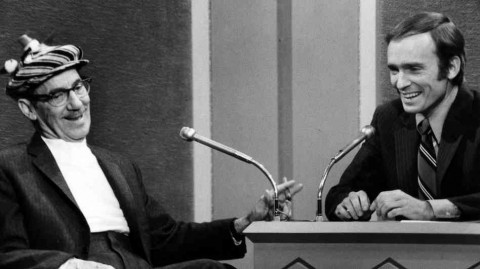
You mentioned your nightclub act earlier. Are there any recordings of your stand-up?
I do have some tapes.
And are they actually worth hearing?
[Laughs.] I played the Hungry Eye nightclub years ago, when it was no longer the hip place that had given us Mort Sahl and Lenny Bruce and Jonny Winters and Nichols and May. It had slipped a great deal by that point. But they recorded me every night there, and I’ve got some of those on old reel-to-reel tape – they’ve probably turned to vinegar by now – but there are times that I wonder about them. I did make one notebook of most of my material from those days. I think I put a star next to ones where Woody (Allen) would come down and see me.
As I’ve said elsewhere, this is how Woody breaks up when you do a line: he waits ‘til after the show, and then he says [Enunciating every word precisely.] “Great. Joke. Cavett.” He did that one my Chinese-German food joke, if you know that. Somebody got the wording wrong recently, which just killed me. I don’t see how you could get it wrong on that: “An hour later, you’re hungry for power.” Somebody stole that, too, which caused great pain. I saw Woody go through that. He would do his brilliant one-line thing, right at the very beginning, when nobody knew who he was, and then they’d show up on The Red Skelton Show or Laugh-In, which – as I said in my book – was the Niagara Falls of plagiarism. They just helped themselves to people’s jokes. Some thought Nixon endeared himself to enough voters by going on Laugh-In and saying, “Sock it to me,” and I asked (executive producer) George Schlatter, “Have you heard the theory that you may have helped re-elect him?” He said, “I know. And I have to live with that.”
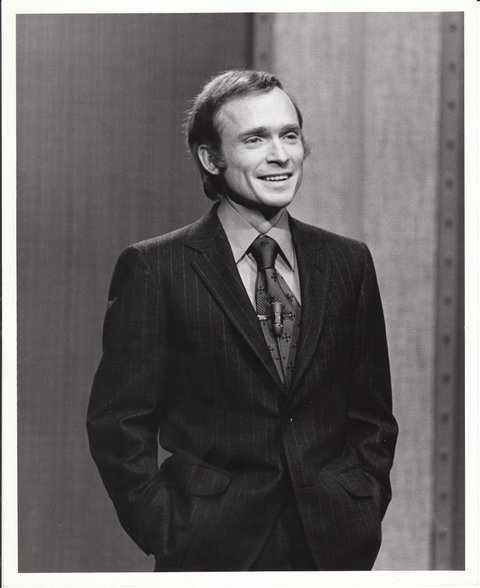
In regards to TV appearances swaying elections, when Ron Nessen (Gerald Ford’s press secretary) hosted Saturday Night Live, do you think that helped or hurt Ford?
[Long pause.] I don’t know. I can’t say. I don’t really know how to judge those things.
In retrospect, it’s one of those appearances that’s probably only remembered now by SNL obsessives.
“How do you want to be remembered?” “With a smile.” That’s what my dear friend James Garner said. I read it the other day in a remembrance of him. And I’ll probably be remembered by what’s apparently going to be on HuffPost Live into eternity, the way all of these things are now: “Dick Cavett Reacts to Death of David Frost: ‘Why Is It Never Dick Cheney?’”
As a one-liner, it’s not bad.
It’s not bad. There’s no punishment adequate to his crimes that I know of. Well, the Apaches had one, but…let’s change the subject!
Before you got your first talk show, you worked on a pilot – one which never made it to series – called…
Oh, no, you’re not going to throw up The Star and the Story, are you? I want to fire your researcher…unless you did it yourself. [Laughs.] You know, people used to say, “How did you get a 90-minute daytime talk show on ABC when you were pretty much an unknown?” And I’d say, “I’ve really never known. I assume someone there thought I was good in something or saw me on Merv.” I was judged not ready for The Tonight Show, but I did about five appearances on Merv that did a lot, and then I did a special for (Bud) Yorkin and (Norman) Lear.
But Woody Fraser, who later was my producer, did The Star and the Story. The pilot was with Van Johnson, and it spent 30 minutes going through his life. But it came up in conversation many years later, and I said, “My God, I’d forgotten almost that. What did that have to do with my getting on ABC?” Apparently, they saw the show, and they hated it, but somebody said, “You know, we ought to give that kid a try with maybe experimenting with having a talk show on ABC in the daytime.” And that’s how it happened!
So what was the format? Would you have spoken to a different actor each episode?
Yeah, it would’ve done that with different actors, half-hour by half-hour. With Van Johnson, it started with “you were born in…” and traced his career from there. He was delightful. I wish I’d kept up with him. He was a lot of fun. I’d love to find that.
I’ll look for it.
Well, if you find it, warn me!
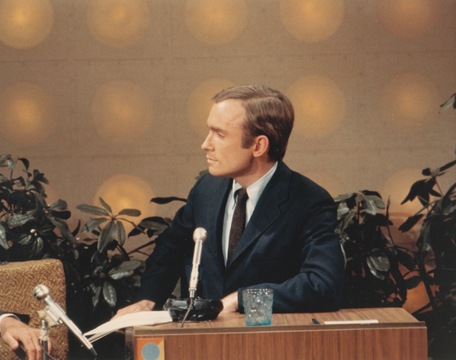
Is there any interview that you almost got, never did, and still regret it?
Mr. Cary Grant. You know, the famous movie actor?
I’m familiar. I’m young, but I’m not that young.
Well, these days, you can’t be too careful! You’re liable to get a blank look. But he said [Offers a Cary Grant impression.] “Oh, Kate was so wonderful on the show, but they’ll only find out how dumb I am!” This was over the phone – in fact, I think it was Miss Hepburn who gave me his phone number – and, oh, I wish we had done it. We would’ve had such a good time. Do you suppose that, in some sense, he really wanted to do the show? But I didn’t press it. I should have. It was just sheer negligence, and probably a desire to get to Montauk for the weekend, when I should’ve spent a day working on that.
(Frank) Sinatra was another one. We could’ve had a good time, too. I got on with him the few times I met him. And once somebody gave me… [Starts to laugh.] This is almost a set piece, but somebody gave me a number to call in New Jersey about getting Frank. And I called, and I got, “What the…? Who the fuck? Nah, Frank doesn’t do shit like this. Look, you gotta call some other time.” CLUNK. I was sorry I didn’t have time to say, “Thank you, ma’am.” So I kind of gave up on that, but I shouldn’t have, because I’m sure he would’ve done it. And we would’ve had such a good time.
Who else did I never get that I would’ve liked to have gotten? Oh! I’ll have to close with this one, and tell me if you know this, have heard of it, or perhaps actually seen it. I’d almost forgotten about it, even though I think I’ve written about it. I ended my second show on a Thursday night, which meant that I’d just taped my Friday night show, and I said, “My thanks to Buddy Hackett, also thanks to Eileen Heckart,” and then to the wings I said, “And I’m sorry, Miss Garbo, we just ran out of time, but maybe you can come back some other time? Goodbye, everybody!” I never expected to hearing anything more about it…and then the hate mail started pouring in. “We have waited all these years, and you get her, and then…”
But my favorite piece of hate mail? “You little sawed-off faggot Communist shrimp.” It came from Waco, Texas. Not surprising, right? [Laughs.] Written on a telegram form, with a return address on the envelope! My lovely and then-new secretary wasn’t going to show it me. And I’m so sorry that I lost it, because I can’t prove it, but it was there: “Dear Dick Cavett, you little sawed-off faggot Communist shrimp.” And I wrote back, “I am not sawed-off!” I wonder if they got it…in either sense!
Related Posts
Comments Off on The Light from the TV Shows: A Chat with Dick Cavett
Posted in: Entertainment, Interviews
Tags: Archibald Cox, Cary Grant, Dick Cavett, Dick Cavett's Watergate, Frank Sinatra, G. Gordon Liddy, H.R. Haldeman, HealtH, Herbert Klein, John Dean, John Erlichmann, John Kenneth Galbraith, John Lennon, John Mitchell, Johnny Carson, Laugh In, Martha Mitchell, Mel Brooks, Merv Griffin, O.J. Simpsons, PBS, Richard Nixon, Rick Moranis, Robert Altman, Sam Ervin, Shout Factory, The Dick Cavett Show, The Jack Paar Show, The Light from the TV Shows, The Simpsons, Watergate, Will Harris, Woody Allen, Yoko Ono, Zabriskie Point








